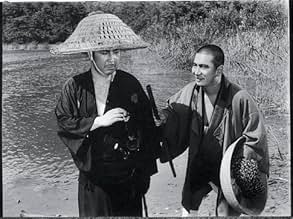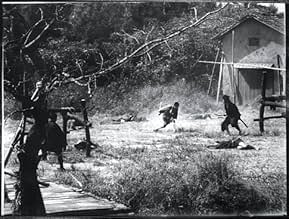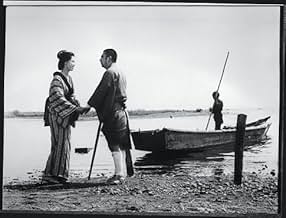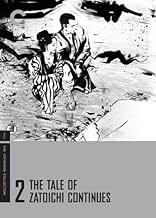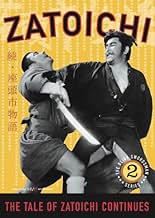IMDb RATING
7.2/10
2.9K
YOUR RATING
The blind masseur and swordsman, Zatoichi, learns of a powerful political figure's secret and is quickly tailed by a group of killers.The blind masseur and swordsman, Zatoichi, learns of a powerful political figure's secret and is quickly tailed by a group of killers.The blind masseur and swordsman, Zatoichi, learns of a powerful political figure's secret and is quickly tailed by a group of killers.
Yaeko Mizutani
- Setsu
- (as Yoshie Mizutani)
Tomisaburô Wakayama
- Nagisa no Yoshiro
- (as Jô Kenzaburô)
- Director
- Writers
- All cast & crew
- Production, box office & more at IMDbPro
Featured reviews
This movie is, I guess, the first of the very long & very excellent zato-ichi series starring the incomparable Shintaro Katsu who also starred in the shorter but every bit as impressive if quite different series: The Razor. I lived in San Francisco in the 1960s & 1970s & used to go watch these films every week at the Japanese theater in the old "Japan Town". Loved them then, love them now. This film in particular is a classic in every way: cinematographically it looks like Eisenstein - every shot a classic. The compositions, textures & tonalities are breathtakingly beautiful. Dramatically, it's every bit as gripping as Yojimbo or the best Ford westerns (e.g. Stagecoach). And finally the sword-fight choreography - None better. Terrific movie!
Return of Masseur Ichi, The (1962)
*** (out of 4)
Blind masseur Zatoichi (Shintaro Katsu) discovers the weakness of a lord and must fight off various assassins who fear he will give away that secret. This was a pretty interesting samurai film from director Kazuo Mori, which relies a lot on fantasy but most of all is just all action and nice swordplay. Katsu makes for a wonderful lead and the supporting roles are filled nicely. The cinematography stretched out the full 2.35:1 looks incredibly sharp and the fights are well staged even though I have a somewhat hard time seeing a blind person doing all that.
*** (out of 4)
Blind masseur Zatoichi (Shintaro Katsu) discovers the weakness of a lord and must fight off various assassins who fear he will give away that secret. This was a pretty interesting samurai film from director Kazuo Mori, which relies a lot on fantasy but most of all is just all action and nice swordplay. Katsu makes for a wonderful lead and the supporting roles are filled nicely. The cinematography stretched out the full 2.35:1 looks incredibly sharp and the fights are well staged even though I have a somewhat hard time seeing a blind person doing all that.
The following review is an extract from the book "Shintaro Katsu´s Zatoichi: Complete guide to all movies", which is now available on Amazon.
Zatoichi (Shintaro Katsu), the famous and prodigious masseur and blind swordsman, has arrived in a new region after the adventures narrated in the first film. After confronting some arrogant soldiers, who throw him into the water when they discover him in the boat in which they were crossing a river, he is hired to massage the head of a samurai detachment. However, while he is doing this work, he indiscreetly discovers a secret of the lord ("I had never had a client like this one..."), so the samurai will persecute him with the intention of killing him.
(...)
Second part of a long line of films with the mythical blind masseur, hardened player and wandering swordsman Zatoichi as the protagonist. The actor who gives life to the character is, once again, the great Shintaro Katsu. The director of this second part is not Kenji Misumi, but another director (Kazuo Mori). The sequel to "Zatoichi monogatari" (shot the same year, 1962) is not at the same level as the original. There are some gaps in the story; for example, it is never quite clear why the samurai want to kill Zatoichi (What is the secret that the masseur has discovered about the lord? It must be such a big secret that not even the spectator has the right to know...
In any case, Zoku Zatôichi monogatari's viewing is a good opportunity to see Shintaro Katsu and Tomisaburo Wakayama (Zatoichi and Yoshiro, repectively), two greats of the sixties and seventies chambara, who were also brothers in real life.
Zatoichi (Shintaro Katsu), the famous and prodigious masseur and blind swordsman, has arrived in a new region after the adventures narrated in the first film. After confronting some arrogant soldiers, who throw him into the water when they discover him in the boat in which they were crossing a river, he is hired to massage the head of a samurai detachment. However, while he is doing this work, he indiscreetly discovers a secret of the lord ("I had never had a client like this one..."), so the samurai will persecute him with the intention of killing him.
(...)
Second part of a long line of films with the mythical blind masseur, hardened player and wandering swordsman Zatoichi as the protagonist. The actor who gives life to the character is, once again, the great Shintaro Katsu. The director of this second part is not Kenji Misumi, but another director (Kazuo Mori). The sequel to "Zatoichi monogatari" (shot the same year, 1962) is not at the same level as the original. There are some gaps in the story; for example, it is never quite clear why the samurai want to kill Zatoichi (What is the secret that the masseur has discovered about the lord? It must be such a big secret that not even the spectator has the right to know...
In any case, Zoku Zatôichi monogatari's viewing is a good opportunity to see Shintaro Katsu and Tomisaburo Wakayama (Zatoichi and Yoshiro, repectively), two greats of the sixties and seventies chambara, who were also brothers in real life.
In the 1960s and 70s, the Japanese made about 500000 Zatoichi films (or so it seems) and I have thoroughly enjoyed them all, even though after a while they all seem to blend together in my mind. Some viewers, like me, will like the familiarity of the character and story, while I am sure others will feel like "if you've seen one you've seen them all". Regardless of your opinion, they are all well-constructed and fun to watch even if the basic premise of the greatest swordsman being totally blind is ridiculous--you just need to suspend disbelief and enjoy.
This is an early installment of the series and it's better than average because it actually has some continuity--making reference to the prior film in the series. Here, in a follow-up, you see Zatoichi pining for a long lost love and having an ultimate showdown with his main rival. Along the way, he falls afoul of a clan who is trying to kill him to keep their secret (their leader "has issues"). And, as usual, the film is filled with amazing sword fights as well as tender moments. This one won't disappoint and is one of the better Zatoichi films.
This is an early installment of the series and it's better than average because it actually has some continuity--making reference to the prior film in the series. Here, in a follow-up, you see Zatoichi pining for a long lost love and having an ultimate showdown with his main rival. Along the way, he falls afoul of a clan who is trying to kill him to keep their secret (their leader "has issues"). And, as usual, the film is filled with amazing sword fights as well as tender moments. This one won't disappoint and is one of the better Zatoichi films.
Even though it was only released a few months after the first movie, The Tale of Zatoichi, the second and last movie of the Zatoichi franchise shot in black and white, takes places exactly one year after the events of the first film and is directly related to it. It's nearly impossible to watch this movie independently as it complements the brilliant first strike accurately. Despite an overall faster pace, it has a more melancholy atmosphere due to the main character's goal to pay respects to his fallen friend and opponent and a moody soundtrack.
Zatoichi is on his way to pay respects at the grave of his friend Hirate whom he was forced to kill one year earlier. The movie has three different plots leading into one. First of all, Zatoichi is hired to massage a powerful lord but when he realizes that the nobleman is insane, he is tracked down by the lord's retainers and hired samurai who want to prevent Zatoichi from telling other people the truth about the lord's mental condition. Secondly, the movie follows a one-armed swordsman and his associate who claim to be samurai but are actually criminals on the run. Thirdly, the movie gives us some more details about the yakuza Zatoichi teamed up with in the first film who felt insulted by him and decide to track him down when they hear he is coming back to town. The movie has a twist that links the three story lines together and ends in a rather abrupt way but still manages to answer all essential questions in just seventy-two minutes.
If compared to the first film, this one has a much faster pace and features more spectacular sword fights. Zatoichi regularly faces big crowds on beaches and in gardens and shows off his precise skills in breathtaking manner. From that point of view, the vivid sequel is more spectacular than the first film. The characters have as much depth as in the first film as Zatoichi still proves he has a strong moral compass while he meets ruthless criminals, charming prostitutes and people somewhere in between on his way to his friend's and opponent's grave. The element that is less convincing than in the first film is the more fast-paced and at times slightly confusing story that feels rushed in just seventy-two minutes and doesn't develop as much depth as it could have requested.
If you are looking for breathtaking martial arts choreography, you might prefer this movie over the first film. If you are looking for a skilled plot with atmosphere and depth, the first movie is clearly superior. I personally prefer the more intellectual first film but must admit that the second one is definitely energizing and entertaining. It's positive that the sequel didn't just try to copy the style of the first film and tried out something different. Overall, it's a quite good movie that justifies the numerous sequels based upon the first Zatoichi film and that should please to any fan of Japanese culture and martial arts cinema.
Zatoichi is on his way to pay respects at the grave of his friend Hirate whom he was forced to kill one year earlier. The movie has three different plots leading into one. First of all, Zatoichi is hired to massage a powerful lord but when he realizes that the nobleman is insane, he is tracked down by the lord's retainers and hired samurai who want to prevent Zatoichi from telling other people the truth about the lord's mental condition. Secondly, the movie follows a one-armed swordsman and his associate who claim to be samurai but are actually criminals on the run. Thirdly, the movie gives us some more details about the yakuza Zatoichi teamed up with in the first film who felt insulted by him and decide to track him down when they hear he is coming back to town. The movie has a twist that links the three story lines together and ends in a rather abrupt way but still manages to answer all essential questions in just seventy-two minutes.
If compared to the first film, this one has a much faster pace and features more spectacular sword fights. Zatoichi regularly faces big crowds on beaches and in gardens and shows off his precise skills in breathtaking manner. From that point of view, the vivid sequel is more spectacular than the first film. The characters have as much depth as in the first film as Zatoichi still proves he has a strong moral compass while he meets ruthless criminals, charming prostitutes and people somewhere in between on his way to his friend's and opponent's grave. The element that is less convincing than in the first film is the more fast-paced and at times slightly confusing story that feels rushed in just seventy-two minutes and doesn't develop as much depth as it could have requested.
If you are looking for breathtaking martial arts choreography, you might prefer this movie over the first film. If you are looking for a skilled plot with atmosphere and depth, the first movie is clearly superior. I personally prefer the more intellectual first film but must admit that the second one is definitely energizing and entertaining. It's positive that the sequel didn't just try to copy the style of the first film and tried out something different. Overall, it's a quite good movie that justifies the numerous sequels based upon the first Zatoichi film and that should please to any fan of Japanese culture and martial arts cinema.
Did you know
- TriviaThe Tale of Zatoichi proved to be so popular that this sequel went into production the same year, 1962.
- ConnectionsFeatured in Best in Action: 1962 (2018)
- How long is The Tale of Zatoichi Continues?Powered by Alexa
Details
- Release date
- Country of origin
- Language
- Also known as
- The Tale of Zatoichi Continues
- Production company
- See more company credits at IMDbPro
- Runtime1 hour 12 minutes
- Color
- Sound mix
- Aspect ratio
- 2.35 : 1
Contribute to this page
Suggest an edit or add missing content

Top Gap
By what name was La légende de Zatoïchi - Le secret (1962) officially released in India in English?
Answer
